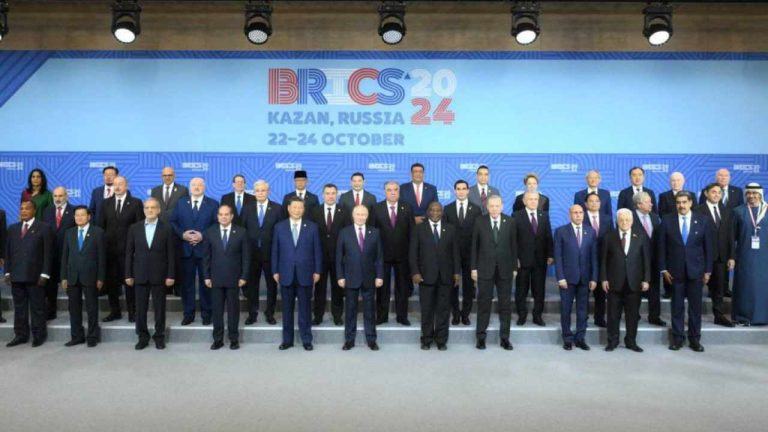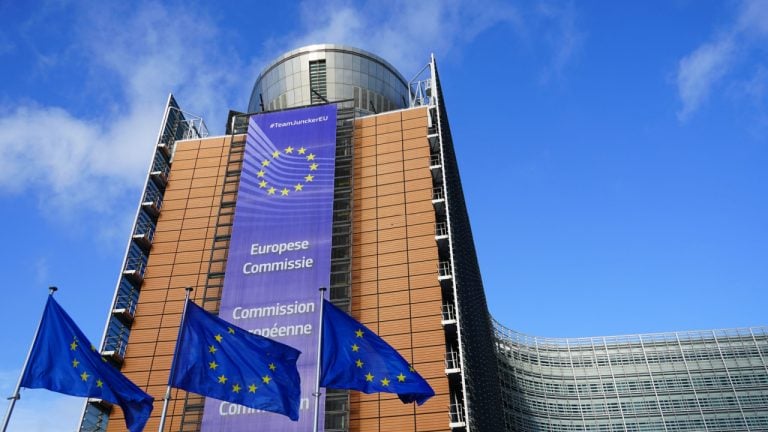 Western efforts to isolate Russia have faltered as 36 nations attended the BRICS Summit in Kazan, a Russian official has declared. The BRICS leaders summit, chaired by Russia, saw 22 high-level delegations, highlighting Russia’s continued global influence despite sanctions and efforts by the U.S. and EU to marginalize it. West’s Isolation Strategy Fails: 36 Nations […]
Western efforts to isolate Russia have faltered as 36 nations attended the BRICS Summit in Kazan, a Russian official has declared. The BRICS leaders summit, chaired by Russia, saw 22 high-level delegations, highlighting Russia’s continued global influence despite sanctions and efforts by the U.S. and EU to marginalize it. West’s Isolation Strategy Fails: 36 Nations […] BRICS is undermining the hegemony of Washington and Brussels as nations increasingly seek equal dialogue and cooperation that prioritize their own interests, according to Russia’s State Duma speaker. He stressed that countries are moving away from serving the U.S. and its allies, instead choosing partnerships that respect sovereignty and offer mutually beneficial cooperation, signaling a […]
BRICS is undermining the hegemony of Washington and Brussels as nations increasingly seek equal dialogue and cooperation that prioritize their own interests, according to Russia’s State Duma speaker. He stressed that countries are moving away from serving the U.S. and its allies, instead choosing partnerships that respect sovereignty and offer mutually beneficial cooperation, signaling a […]
What is the potential impact of MiCA on the EU crypto and blockchain market, and what other regulations can be expected for this rapidly evolving industry?
On April 20, the European Parliament voted to pass the Markets in Crypto-Assets (MiCA) regulation, the European Union’s main legislative proposal to oversee the crypto industry in its member countries.
The MiCA regulation is a significant development for the crypto industry in the European Union. Prior to MiCA, crypto companies had to comply with 27 different regulatory frameworks across the EU member states, with Germany or France being costly and burdensome, for example.
Under MiCA, however, EU-wide regulations will apply, allowing companies to operate throughout the entire EU crypto market with a MiCA license granted in one country. This will increase the competitiveness of EU startups and may result in them gaining market share from unregulated competitors.
Moreover, MiCA could encourage more institutional adoption and activity in the EU crypto and blockchain market. Patrick Hansen, director of EU strategy and policy at stablecoin issuer Circle, told Cointelegraph that MiCA will enable European crypto firms to scale and grow faster, allowing licensed companies to offer their services throughout the world’s largest single market, with roughly 450 million people:
“The legal clarity will also foster innovation amongst financial institutions that have been previously hesitant to launch products and services due to regulatory uncertainty. Additionally, as MiCA is the first comprehensive regulatory framework for crypto assets from a major jurisdiction in the world, it is likely to attract considerable foreign capital and talent to the region.”
For Moritz Schildt, a board member of the Hanseatic Blockchain Institute and the German Blockchain Association, the biggest advantage of MiCA is that “it will come into force already this year,” giving the EU a chance to provide a unified regulatory framework for crypto assets and related providers.
Magazine: Here’s how Ethereum’s ZK-rollups can become interoperable
Creating a regulatory framework for a technology that sees new developments and outgrowths practically every month and evolves as dynamically as the tokenization of investment opportunities is “very challenging.”
“It should come as no surprise, therefore, that some regulations are not yet optimal and that questions about concrete applications remain unanswered,” Schildt said, adding that with MiCA, Europe has the opportunity to position itself “as a location for innovation and quality.”
Peter Grosskopf, co-founder of decentralized finance (DeFi) project Unstoppable Finance, is also convinced that MiCA will benefit the EU crypto and blockchain market. First, companies from outside Europe will have to register with a company in the EU, so there is a “direct impact on job creation and tax payments.”
Second, many jurisdictions take an overly strict approach to regulating crypto. For example, “the U.S. does regulation by enforcement.” Compared with other regions, the EU will become “a safe space for the industry as a whole, and innovators from around the world will start to build their businesses here,” Grosskopf said.
Stefan Berger also noted that the United States is currently cracking down on the crypto sector. According to the German politician and European Union Parliament rapporteur for MiCA, the European crypto asset industry has regulatory clarity that the United States doesn’t, and it would be wise for U.S. lawmakers to take a cue from MiCA:
“For me, the biggest advantage is that we create trust, which is a crucial booster, especially for young technologies like blockchain. I expect regulation to become a global standard-setter over time. A global MiCA would be desirable at some point.”
Through MiCA, European policymakers are trying to create a reliable framework that builds trust through legal certainty. This includes a uniform classification of assets and the requirement for coin issuers to provide a white paper that discloses all relevant information about the coins, such as their energy consumption and environmental impact.
In addition, MiCA will ensure that every new token is reviewed for approval to check that the business model does not threaten the stability of the cryptocurrency, which creates more transparency for investors.
But the crypto and blockchain sector is constantly evolving. “Tokenization is not hype and will become an integral part of our lives and financial world,” said Berger. More and more business models are emerging based on nonfungible tokens (NFTs), for example, which have been largely exempt from MiCA. (The new regulation will only address crypto-asset service providers that offer services for NFTs).
But according to Berger, NFTs are next on the docket, with European lawmakers looking at what type of regulation would benefit the industry and consumers.
Schildt also expects further regulations on NFTs relatively soon. “We should reconsider the traditional classification of investment products.” According to the expert, in the future, investments “that were previously considered ‘art collections,’ we will also qualify as capital investments.”
Some aspects of MiCA have yet to be defined through upcoming technical standards and guidelines.
For example, what are the specific liquidity requirements for electronic money token reserves? EU regulators will develop these standards over the next 12 to 18 months, and “the practical success of MiCA will largely depend on this implementation work — also referred to as Level 2 legislation,” Circle’s Hansen said.
Hansen further noted that, beyond MiCA, EU institutions are finalizing a new Anti-Money Laundering (AML) rulebook that will be “critical for crypto firms.”
Another critical review is that of PSD2, the EU’s main payments directive, which will also significantly impact crypto firms.
And finally, in about 18 months, the European Commission will publish a detailed report on DeFi and may take further legislative steps to regulate the space. “Brussels prides itself on being a global regulatory leader, and MiCA is just the first of many steps to come,” said Hansen.
MiCA will NOT apply to "crypto-asset services provided in a fully decentralised manner without any intermediary"
— Blockchain for Europe (@BlockchainforEU) April 15, 2023
The @EU_Commission will produce a report in 18 months assessing the "necessity and feasibility of regulating #DeFi" pic.twitter.com/utM4kOw4SM
Unstoppable Finance’s Grosskopf also expects DeFi regulation to become a hot topic following the next round of elections in Europe, as MiCA will not apply to “crypto-asset services provided in a fully decentralised manner without any intermediary.”
Recent: Foreign trade and pensions: What’s next for Russia’s CBDC project?
“I think it’s important to be proactive and start thinking about how to regulate DeFi as early as possible in order to influence the process,” he said, stating that the new AML regulation is currently under discussion and will most likely become a reality before MiCA.
Although it’s still unclear exactly how European lawmakers will regulate NFT and DeFi or whether there will be new requirements regarding smart contracts, the success of the first step toward regulation — MiCA — could provide a significant boost to both EU crypto businesses and the EU economy as a whole. However, whether this success is realized will depend on the practical implementation standards developed in the future.
 The European Commission has approved a proposal to accelerate the introduction of euro instant payments. The technology is there and Europeans should be able to send and receive money immediately, the executive body said, revealing its intentions to push the industry toward wide adoption. EU Moves to Make Instant Payments Widely Available Throughout Europe A […]
The European Commission has approved a proposal to accelerate the introduction of euro instant payments. The technology is there and Europeans should be able to send and receive money immediately, the executive body said, revealing its intentions to push the industry toward wide adoption. EU Moves to Make Instant Payments Widely Available Throughout Europe A […]
The Brussels Minister who puts his entire €5,500 salary into Bitcoin on the first of every month sat down with Cointelegraph to discuss Bitcoin.
Christophe De Beukelaer is the first European politician to convert his entire salary to Bitcoin. He kicked off 2022 with the bold move, hoping to raise awareness about Bitcoin and alternative monetary models, financial education and to get people talking.
De Beukelaer first got into Bitcoin and blockchain in 2017, and foresees a future in which Bitcoin and cryptocurrencies play a role as a “counterpart to the traditional financial world.” He gave an interview to Cointelegraph to delve deeper into his vision for Bitcoin and his motivations behind being paid in Bitcoin (BTC).
When asked about how long it took to get to grips with Bitcoin and “go down the rabbit hole,” De Beukelaer said that not taking the time to learn about the protocol is
“One of the biggest risks we have in Europe for the moment.” He explained:
“The political people don't take time for this journey. They are very busy with the day to day administrations of the cities and the countries, but they don't stop and say, OK, what's happening now? What are the big evolutions coming in the next 10, 20, 50 years? And that's the job.”
The 34 year old Brussels Minister conceded that the lack of awareness surrounding the cryptocurrency and Bitcoin space is a “big problem,” and that if Europe doesn’t get its hands dirty with the cryptocurrency space then “Asian the US will decide everything.”
Related: No regrets for NYC mayor receiving his first Bitcoin paycheck during dip
In his view, being paid in Bitcoin is an excellent way of raising awareness about the space and as a professional European official, the act brings another layer of credibility to the space.
When pushed on a Bitcoin price prediction for 2022, he masterfully dodged the question, joking that 2022 would provide “an incredible performance.”

The Belgian MP will convert his monthly salary of EUR 5,500 to Bitcoin using the country’s popular cryptocurrency trading platform Bit4You.
Bitcoin (BTC) craze among lawmakers has reached the Belgian parliament now, as Brussels member of parliament Christophe De Beukelaer became the first European politician to convert his salary to Bitcoin.
The Brussels MP’s monthly salary of EUR 5,500 will be converted to Bitcoin using Bit4You crypto trading platform, reported Bruzz. Beukelaer who represents Humanist Democratic Centre (CDH) party, hopes his move would inspire other politicians in the region to show a similar interest in the nascent tech.
Beukelaer cited the example of New York City Mayor Eric Adams and how American politicians are working to make their native state or city a Bitcoin hub. He said:
“New York City Mayor Eric Adams has spent three months collecting his Bitcoin salary to make New York the Bitcoin hub. I think it is not too late for Brussels and Belgium to play a leading role in the cryptocurrency industry."
Miami Mayor Francis X. Suarez is another popular lawmaker who is known for his BTC advocacy. He has been quite vocal about making the city a Bitcoin hub and apart from getting his own salary in Bitcoin, he has been working on policies to avail the same option for the city employees.
Related: No regrets for NYC mayor receiving his first Bitcoin paycheck during dip
Not just politicians, some of the biggest names in the sports have also come forward to accept BTC salaries. A total of seven NFL stars have chosen to get paid in Bitcoin until now, similarly, NBA stars such as Klay Thompson and Andre Iguodala have also announced they would accept Bitcoin salaries moving forward.
The confidence of sports stars added with a growing number of politicians looking to get paid in BTC indicates the growing popularity of Bitcoin as an asset.
 A bar in Brussels frequented by local anarchists has introduced crypto payments. Bitcoin is the money of the future, say the owners who have recently renovated the place. It is among the first such establishments in the Belgian capital to take coins for pints, they say. Dolle Mol Bar on Rue des Éperonniers Will Take […]
A bar in Brussels frequented by local anarchists has introduced crypto payments. Bitcoin is the money of the future, say the owners who have recently renovated the place. It is among the first such establishments in the Belgian capital to take coins for pints, they say. Dolle Mol Bar on Rue des Éperonniers Will Take […]